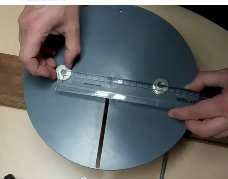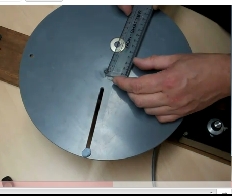20. Video
From Mechanics
(Difference between revisions)
(New page: __NOTOC__ {| border="0" cellspacing="0" cellpadding="0" height="30" width="100%" | style="border-bottom:1px solid #797979" width="5px" | {{Not selected tab|[[20. Circular Motion|The...) |
|||
| (2 intermediate revisions not shown.) | |||
| Line 10: | Line 10: | ||
{| width="500px" cellspacing="10px" align="center" border="1" | {| width="500px" cellspacing="10px" align="center" border="1" | ||
| - | | ''' | + | | '''Discs on a Turn Table''' |
| valign="top"| | | valign="top"| | ||
|- | |- | ||
| - | | [[Image: | + | | [[Image:Discs1.JPG]] |
| - | | valign="top"| | + | | valign="top"| Here four discs are placed on a turntable. The turntable starts to rotate and its angular speed is gradually increased. Explain why the discs begin to slide in the order shown in the clip. |
| - | http://www.youtube.com/watch?v= | + | http://www.youtube.com/watch?v=Oa9SD2sqgXQ |
|- | |- | ||
| - | | ''' | + | | '''Discs of Different Masses on the Turn Table''' |
|valign="top"| | |valign="top"| | ||
|- | |- | ||
| - | | [[Image: | + | | [[Image:Discs2.jpg]] |
| - | |valign="top"| | + | |valign="top"| If two discs of different masses are placed at the same distance from the centre of the turntable, why if either will begin to slide first? Make your prediction before watching the clip. |
| + | |||
| + | http://www.youtube.com/watch?v=S9I2uaHKgD4 | ||
| - | http://www.youtube.com/watch?v=3V6EhZY_dKo | ||
|- | |- | ||
| - | | ''' | + | | '''Finding the Coefficient of Friction between the coin and the Turn Table ''' |
|valign="top"| | |valign="top"| | ||
|- | |- | ||
| - | | [[Image: | + | | [[Image:coin.jpg]] |
| - | |valign="top"| | + | |valign="top"| Use the data that you can gain from the experiment shown in the clip to calculate the coefficient of friction between the disc and the turntable. |
| - | + | ||
| - | + | ||
| + | http://www.youtube.com/watch?v=gsXwqY6PGzY | ||
|} | |} | ||
Current revision
| Theory | Exercises | Video |
| Discs on a Turn Table | |
| | Here four discs are placed on a turntable. The turntable starts to rotate and its angular speed is gradually increased. Explain why the discs begin to slide in the order shown in the clip.
http://www.youtube.com/watch?v=Oa9SD2sqgXQ
|
| Discs of Different Masses on the Turn Table | |

| If two discs of different masses are placed at the same distance from the centre of the turntable, why if either will begin to slide first? Make your prediction before watching the clip.
http://www.youtube.com/watch?v=S9I2uaHKgD4
|
| Finding the Coefficient of Friction between the coin and the Turn Table | |

| Use the data that you can gain from the experiment shown in the clip to calculate the coefficient of friction between the disc and the turntable. |
